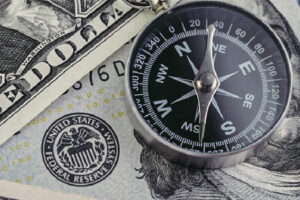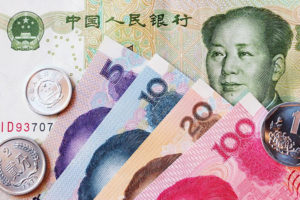Coronavirus and the threat of global recession. "Crash on the oil market is the tip of the iceberg"
Coronavirus contributes to an increase in deaths, panic and a number of events that can lead to a sudden recession. The OECD predicts that the growth rate of the world economy will decrease by about 0,5 percentage points. What are the possible scenarios?
Coronavirus is much more dangerous than it was thought until recently, according to CNBC, citing employees of the World Health Organization (WHO). The mortality rate is 3,4 percent, and previous estimates were for two percent of those infected.
The pessimistic scenario assumes a pandemic, i.e. an epidemic of the disease in large clusters, on different continents, simultaneously. Coronavirus causes widespread fear, although it is not the first epidemic of such a large scale in recent years. A little over 100 years ago, the Spanish flu infected 25 to 30 percent of the world's population and killed around 40-100 million people.
But without looking that far - in the last 10 years, the World Health Organization has announced the threat of a pandemic five times: in 2009 due to the H1N1 flu virus; in 2014 - polio; 2014 - Ebola virus; in 2016 - the Zika virus; in 2019 - again due to Ebola. However, no epidemic qualified as a pandemic.
The last pandemic actually announced was the H1N1 flu pandemic, which erupted in 2009 and killed several hundred thousand people in the following months. The World Health Organization was then criticized for announcing a pandemic because this decision forced states to take costly countermeasures, which may explain why WHO is trying to avoid the term "pandemic" today.
Despite China's efforts, secondary outbreaks appeared, first outside of Wuhan, cut off from the world, and then outside China. Moreover, WHO sees a very dangerous focus of a global pandemic in the Middle East. Leaky borders, increased movement of workers from the poorest countries around the world, big (and still open) airports
It can therefore be concluded that the mobility of people hinders the effective operation of modern medicine. That is why the effects of people and economies are widely commented on.
Due to the epidemic, central banks cut interest rates - the American one Federal Reserve (Fed) decided to fall back on interest rates for the first time since 2008. - Pmonetary policy is not the best remedy for a shock to economic activity - here fiscal policy has more room to show off. Last week's Fed decision showed that even a 50 bp cut suddenly may not bring peace to the markets if it is perceived as insufficient. In addition, global stock exchanges are declining in the face of investor fears of further epidemic development coronavirus - says Konrad Białas, chief economist at TMS Brokers.
Possible scenarios
“At the end of the first week of March, we saw massive declines in the markets, and the second week of the month opened the so-called black monday. We saw sharp reshuffles in the currency market, large declines in contracts, incl. on DAX or S & P500, declines on stock exchanges and stopped trading in US stocks, the lowest WIG20 price since 2009 and a crash on the crude oil market (the price of black gold dropped by as much as 30%). - The drop in oil demand is the tip of the iceberg " - ocenia Bartosz Sawicki, head of the TMS Brokers Analysis Department and adds - "EIA reports that oil demand in 2020 will not increase for the first time since 2009, the bottom of the global financial crisis."
The widening epidemic of coronavirus translates into a decline in oil demand. At this stage, it is difficult to estimate it reliably, but the quarantine itself in China was to reduce the demand for several hundred thousand barrels per day per year. In a sensitive situation, OPEC countries could not find an agreement with Russia regarding the scale of further reduction of production.
Oil market reshuffle
According to the expert, sharp shifts await the raw material market.
- Many producers will again find themselves under pressure from lower prices than extraction costs. At the same time, one should observe the credit market, which attracted capital like a magnet. The energy sector has a large share in the market for the riskiest corporate bonds in the US. The oil crash may also cause a further slump in US corporate spending on durable goods. Here, the already known threats are quarantines and problems with the availability of some goods - thinks Sawicki.
What's more - the world's largest oil concern Saudi Aramco is planning deliveries at 12,3 million barrels per day in April. For comparison, Saudi Arabia in January limited production to less than 10 million barrels per day. Major producers, recent allies under OPEC +, intend to fight for market shares by increasing production and selling oil at a giant discount. In response to information, the WTI oil price fell from 33,50 to 32 USD per barrel.
Central bank support
In addition, it can be expected that the global economy will suffer not only in terms of demand (fewer people will benefit from travel offers), supply (suspension of production, among others, in Chinese factories), but also in terms of increased public expenditure.
- Fiscal and monetary policy has been harnessed to counteract the effects of the virus - evaluates Chief Economist TMS Brokers Konrad Białas.
There are no clear signals that other governments and central banks see the need for extraordinary actions, although there are assurances that they are ready to take the necessary steps. The problem is that markets and decision makers are very much out of step when it comes to this necessity.
- In the G10, the RBA and the Bank of Canada have also cut interest rates, although it must be admitted that it was easier for them to make this decision at the meetings already scheduled. The ECB, the Bank of England and the Bank of Japan continue their activity on verbal assurances and using the need to obtain additional data. I am not an advocate of reacting myself, but now every day of calming investors, consumers and entrepreneurs may weigh in on whether economies will touch down recession - says chief economist TMS Brokers Konrad Białas.
Due to the epidemic, the growth rate of the world economy will drop by around 0,5 percentage points. - provides for the Organization for Economic Cooperation and Development (OECD). This will affect, among others restrictions against the spread of the virus and problems arising from disrupted commercial connections. According to this scenario, the epidemic will begin to expire in the second quarter of this year, because the fight against COVID-19 will not take place in other countries like in China, where the economy has been almost paralyzed by restrictions on the movement of people. And this is enough to slow the pace of the global economy by 0,5 percent. compared to the scenario of November 2019, when OECD assumed that it would amount to 2,9 percent. Result at the level of 2,4 percent would be the weakest since 2009.
Political consequences
It has been said for months that the economy is slowing down, that the specter of global recession is hanging over us. Coronavirus can cut the speculation band and make the bust a reality. This will mean not only economic but also political consequences.
Recently, economist Nouriel Roubini, Ph.D. from Harvard University, spoke about the crisis in 2008. He now claims that stock markets will lose 30 to 40 percent due to coronavirus. And that this is a moment that will ruin Donald Trump's chances of winning the presidential election.
- It's always been like that in history. Ford lost to Carter after the 1973 oil shock, Carter lost to Reagan after a second oil shock in 1979, and Bush lost to Clinton after the invasion of Kuwait. Democrats aren't tough, but Trump is dead - evaluates Nouriel Roubini.
Roubini is not alone in his assessment. Many observers of US policy agree that it is the epidemic that will elect a new president, and the possible outbreak of coronavirus in America and the plunging of the economy into recession would knock Trump's biggest assets in this election. Just like keeping the situation under control would make him an unquestioned favorite.
The same applies to Polish presidential elections. Both the incumbent president and the independent presidential candidate Szymon Hołownia announced on Monday that due to the threat of coronavirus they are giving up large, open meetings in the election campaign. The head of the Prime Minister's office Michał Dworczyk does not rule out postponing the election date.
- If the development of the coronavirus occurred as in Italy and covered, for example, the entire province, and entire municipalities were in quarantine, we would have to think about introducing a state of natural disaster - he said.
However, the most pessimistic scenario assumes Dante's scenes, unseen from Of the Great Depression: official quarantines, self-isolation, empty spaces in stores, price increases, or forced quarantine of companies that, e.g. according to the recently adopted special legislation - will have to hand over part of their assets to fight coronavirus.
A number of such events are like a chain that can lead to a sudden recession.
Markets are trying to rebound after Monday's slump, but coronavirus reports are reminding us that it could get worse before it gets better. Investors have to maneuver between information about the entire Italy falling into the red zone and the announcements of a new economic package in the US. Risk aversion will be sustained, but there will be times of relief rallies - but calms down Konrad Białas, chief economist at TMS Brokers.
Source: DM TMS Brokers press material






















![Forex Club – Tax 9 – Settle tax on a foreign broker [Download the Application] Forex Club - Tax 9](https://forexclub.pl/wp-content/uploads/2024/02/Forex-Club-Podatek-9-184x120.jpg?v=1709046278)
![Trading View platform – solutions tailored to the needs of traders [Review] trading view review](https://forexclub.pl/wp-content/uploads/2024/03/trading-view-recenzja-184x120.jpg?v=1709558918)
![How to connect your FP Markets account to the Trading View platform [Guide] fp markets trading view](https://forexclub.pl/wp-content/uploads/2024/02/fp-markets-trading-view-184x120.jpg?v=1708677291)
![How to invest in ChatGPT and AI? Stocks and ETFs [Guide] how to invest in chatgpt and artificial intelligence](https://forexclub.pl/wp-content/uploads/2023/02/jak-inwestowac-w-chatgpt-i-sztuczna-inteligencje-184x120.jpg?v=1676364263)


![WeWork – the anatomy of the collapse of a company valued at $47 billion [WeWork, part II] wework bankruptcy story](https://forexclub.pl/wp-content/uploads/2024/04/wework-bankructwo-historia-184x120.jpg?v=1711729561)
![Adam Neumann – the man who screwed up Softbank [WeWork, part AND] adam neumann wework](https://forexclub.pl/wp-content/uploads/2024/04/adam-neumann-wework-184x120.jpg?v=1711728724)





![How to transfer shares to another brokerage office [Procedure description] how to transfer shares to another brokerage house](https://forexclub.pl/wp-content/uploads/2024/03/jak-przeniesc-akcje-do-innego-biura-maklerskiego-184x120.jpg?v=1709556924)

![The most common mistakes of a beginner trader - Mr Yogi [VIDEO] Scalping - The most common mistakes of a beginner trader - VIDEO](https://forexclub.pl/wp-content/uploads/2024/03/Scalping-Najczestsze-bledy-poczatkujacego-tradera-VIDEO-184x120.jpg?v=1711601376)
![Learning patience: No position is also a position - Mr Yogi [VIDEO] Scalping - Learning patience - No position is also a position - VIDEO](https://forexclub.pl/wp-content/uploads/2024/03/Scalping-Nauka-cierpliwosci-Brak-pozycji-to-tez-pozycja-VIDEO-184x120.jpg?v=1710999249)
![When to exit a position and how to minimize losses - Mr Yogi [VIDEO] Scalping - When to exit a position and how to minimize losses - VIDEO](https://forexclub.pl/wp-content/uploads/2024/03/Scalping-Kiedy-wyjsc-z-pozycji-i-jak-minimalizowac-straty-VIDEO-184x120.jpg?v=1710336731)


















